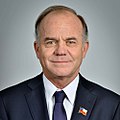
The Ministry of Agriculture (Spanish : Ministerio de Agricultura) is an institution in charge of the agriculture and livestock in Chile. [1] It was created in 1924 under the name of Ministry of Agriculture, Industry and Colonization; its current name was established in 1930.
Contents
Since August 2025, Ignacia Fernández Gatica is the current minister.















